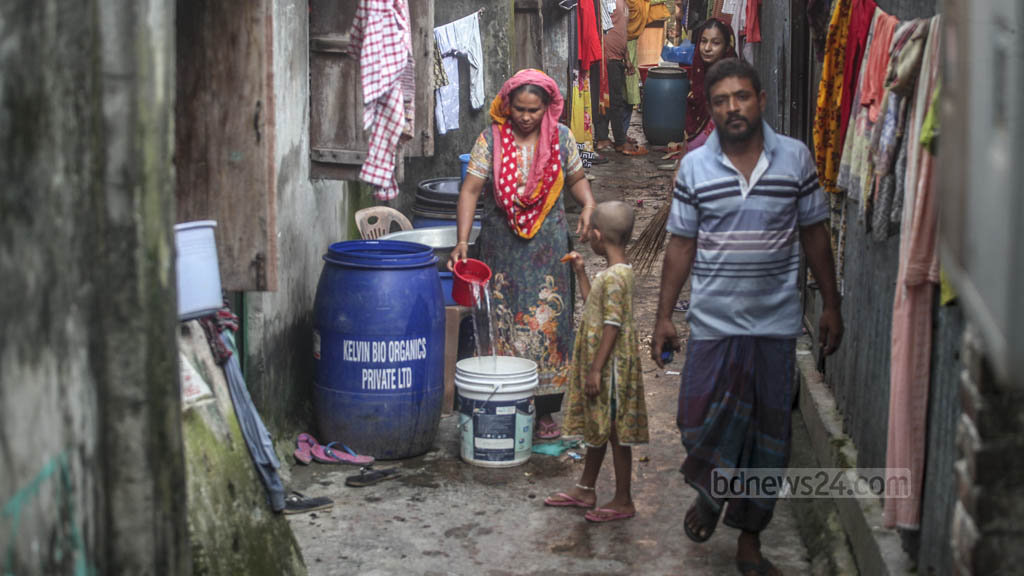Bangladesh braces for downpours, landslide risk • Farzana becomes first Bangladeshi to join UN youth panel on climate change • ♻️ Eco-Friendly Products: How to Choose Sustainable Living • Veteran journalist Bibhuranjan Sarkar reported missing in Dhaka • Body of missing journalist Bibhuranjan found in Meghna River • 🌾 Organic Farming: New Technologies for Agriculture in Bangladesh • 🏭 Green Industry: Investments in Renewable Energy Sector • Without ceasefire and aid, 132,000 children risk death from malnutrition in Gaza • 🌱 Solar Power: Bangladesh's Renewable Energy Revolution
Arthur Rahman
EcoBangla Correspondent
August 22, 2025
34
0

DHAKA - The Dhaka Water Supply and Sewerage Authority has effectively turned Ibrahimpur into a ghost town, with at least 15 families abandoning their homes in just two months as taps remain bone dry while WASA continues collecting monthly bills. "To-Let" signs now plague more than half the buildings on Kamal Khan Road, marking a humanitarian disaster that WASA officials ignore while pocketing payments for services they refuse to provide. "This is systematic theft," said Rashid Ahmed, whose family endured three waterless weeks before fleeing. "WASA takes our money every month, then leaves us to die of thirst." Criminal Negligence on Display Taps have run dry for weeks across Ibrahimpur, forcing remaining families to buy expensive bottled water or depend on pathetic nighttime supplies that often never materialize. Children miss school while parents hunt desperately for water. Elderly residents face dangerous dehydration. The crisis spans at least 10-12 Dhaka areas including Mirpur, Mohammadpur, and Gulshan, with some neighborhoods receiving water just one hour twice daily—if they're lucky. "My 80-year-old mother can't carry water buckets up four flights," said Fatima Begum, who fled last month. "WASA destroyed our neighborhood and our lives." WASA's Pathetic Excuses Officials blame "declining groundwater levels" as if this crisis emerged overnight. These same bureaucrats ignored decades of scientific warnings about aquifer depletion while continuing unsustainable extraction and pocketing development funds. Their solution? Tell desperate residents to "be patient" while collecting another month's bills. Meanwhile, WASA guarantees unlimited water to five-star hotels and shopping malls while denying basic service to paying residential customers. This is water apartheid, pure and simple. The Human Toll The stories reveal WASA's true brutality: - Salma Khatun joins 4 AM water queues that yield nothing, returning to face her crying children - Mohammad Karim spent 15,000 taka on bottled water last month—more than his rent—while WASA keeps billing him - Nasir Uddin closed his tea shop because customers won't visit waterless areas These aren't statistics. These are lives destroyed by institutional contempt. Demands for Justice The people deserve immediate action: 1. Emergency water supply within 48 hours to all affected areas 2. Full compensation for families forced to relocate 3. Criminal prosecution of officials collecting bills while refusing service 4. Complete system overhaul in affected neighborhoods 5. Public water allocation data to expose discriminatory practices Time for Accountability Bangladesh, surrounded by rivers, cannot provide water to its capital's residents. This shames the nation internationally while government officials travel abroad boasting about development success. The mass exodus from Ibrahimpur delivers a damning verdict: WASA has transformed from public service into predatory institution that extracts money while delivering misery. Every empty apartment and fleeing family represents total governance failure. The question isn't whether WASA can solve this crisis—it's whether they'll admit failure and take radical action to restore public trust. For Ibrahimpur's families, time has run out along with the water. They deserve justice, compensation, and a government that actually serves people instead of exploiting them.
Please sign in to leave a comment
No comments yet. Be the first to share your thoughts!
No related articles found.